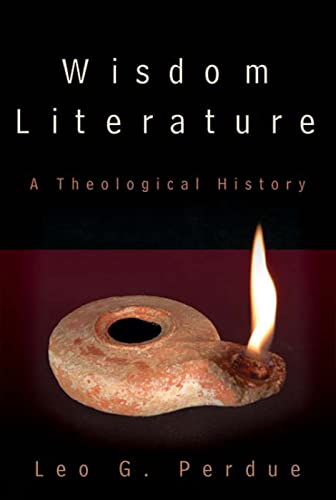Wisdom Literature: A Theological History
Written by Leo G. Perdue Reviewed By Seulgi L. ByunIn Wisdom Literature: A Theological History, Leo Perdue, a prolific writer and highly regarded scholar, gives a comprehensive overview of wisdom literature with the aim of providing a theological history. For those familiar with Perdue’s work, it will come as no surprise that creation is the central theological theme of wisdom literature, an argument which is laid out in detail in his volume Wisdom and Creation (Abingdon, 1994). In the present volume, Perdue attempts to trace the historical development of wisdom theology within a socio-historical framework in order to provide a social and historical context for the theologies of the sages. His main conclusion is similar to his earlier work: ‘creation, expressed through cultural metaphors, is the central theological theme of the sages’ (p. 37).
In chapter 2, he begins by surveying the major OT theologies and other works on the theology of wisdom literature in modern scholarship, and it becomes apparent quickly that he is dissatisfied with the traditional views of Gerhard von Rad, Claus Westermann, Walther Eichrodt, and others, who ‘ignore’ creation as the major theme and maintain that salvation-history, election, or covenant are the major themes in the OT. For Perdue, not only is creation the major theme of wisdom literature, but other themes, such as election and covenant, can be understood only in the light of divine creation and providential rule over cosmos and history, both in OT theology and in wisdom literature.
The bulk of the book is devoted to in-depth discussions of the individual wisdom books. The chapters are generally organised into three parts: the historical and social setting, the literary structure, and the historical theology of each book. In chapter 3, an analysis of the book of Proverbs, Perdue begins by providing a very helpful summary of the history, literature, and scribal traditions of Egypt. He then proceeds to discuss Israel’s engagement with Egypt and the influence that this had on the sapiential literature. The rest of the chapter focuses on the portions of Proverbs that address the theme of creation. In chapter 4, Perdue addresses the book of Job, the redaction of which he dates to the exilic period. First, he outlines the history of the Babylonian conquest, Jewish life in captivity, literary activity, and wisdom culture in Mesopotamia, all of which, he argues, influenced the book of Job to varying degrees. This is followed by a lengthy discussion of the literary structure of Job, some detailed exegetical observations, and a few general concluding remarks. In chapter 5, Perdue extends the discussion beyond the traditional wisdom books to examine select wisdom psalms (1; 19; 119), scribalism in sapiential literature, and the meaning of Torah in the exilic and early Second Temple period. Perdue argues that the Torah is the theological center of Jewish wisdom in the Persian period and ‘takes on significant cosmological and moral characteristics that actualize divine creation, providence, and human righteousness’ (p. 160), which is his basis for incorporating the Torah psalms into the discussion. In chapter 6, a lengthy introduction to Hellenistic history and culture is followed by an extensive discussion on the theology of Qohelet, which, Perdue argues, has been heavily influenced by Hellenism. He contends, for example, that the skepticism of Qohelet is related to the historical and social context of the Hellenistic period, specifically, the Skeptics of the Greek academies and Egyptian grave autobiographies. In the final chapters, Perdue continues to venture beyond the traditional wisdom corpus—Proverbs, Job, Qohelet—to consider the aprocryphal books of Ben Sira and the Wisdom of Solomon. He justifies the inclusion of the apocryphal books by arguing that they ‘provide insight into the religious worlds of ancient Israel and early Jewish sages’, which is ‘the basis for the shaping of contemporary theology’ (p. 8), but he makes clear that his intention is not to write a theology for the church.
The strength of the book lies undoubtedly in the introductory sections to each chapter, where Perdue provides detailed background material (historical, social, and cultural) for each wisdom book or category, but this is also a potential limitation. In placing each book within a specific setting—some of which are still disputed—he bases his entire theological analysis of each book, and the theology of the sages as a whole, to the socio-historical situation of the presumed time periods. Another possible weakness is his tendency to overreach to connect metaphors, myths, and allusions in the wisdom corpus to the single theme of creation, something which is especially apparent in the section on Job.
In sum, Wisdom Literature: A Theological History is a comprehensive overview of the wisdom books with special attention to the historical contexts and theological dimensions of each book. There are points where some will undoubtedly disagree; nevertheless, it is an important contribution that is both creative and challenging, and it should be welcomed by all who are engaged in OT studies.
Seulgi L. Byun
Seulgi L. Byun
Grove City College
Grove City, Pennsylvania, USA
Other Articles in this Issue
We want to understand how the power of God comes into our preaching...
Martin Luther was a pastor-theologian. He worked out his theology in the midst of teaching, preaching, participating in public controversy, and meeting all kinds of pastoral needs...
Bearing Sword in the State, Turning Cheek in the Church: A Reformed Two-Kingdoms Interpretation of Matthew 5:38–42
by David VanDrunenAmong the many biblical passages that provoke controversial questions about Christian non-violence and cooperation with the sword-bearing state, perhaps none presses the issue as sharply as Matt 5:38–42...
Does “Christocentrism” betray an asymmetrical trinitarianism that neglects the Father and the Spirit? The spate of calls for “Christ-centeredness” in evangelicalism’s past few generations collude with the twentieth century’s revivified trinitarianism to prompt this question...
feel honored to be able to give this lecture named after John Wenham...







